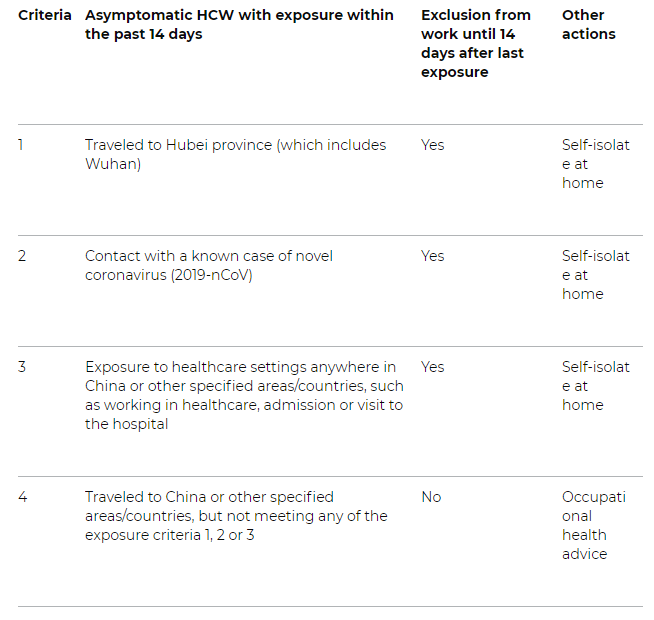Novel Coronavirus 2019-nCoV - What Agency Workers Members Should Know
A novel (new) coronavirus capable of causing severe respiratory diseases such as pneumonia was identified in China towards the end of December 2019. The virus is referred to as the 2019-nCoV or Novel Coronavirus.
Authorities believe that the source of the virus is a seafood market in Wuhan Hubei Province. As of this writing, the virus is spreading worldwide and infecting people, with 43,107 confirmed cases. 42,708 cases are in China.
Since this is a new virus, humans are not immune to it and no vaccine has been developed to prevent infection. Antibiotics cannot work against the coronavirus because this is a viral infection.
What are Coronaviruses?
Coronaviruses are common and known to be one of the primary causes of the common cold. On infection, one typically presents with mild to moderate cold-like symptoms. The total number of coronavirus strains known to man is seven, including this new one.
Coronaviruses tend to have the most negative effect on people who are already suffering from another illness or comorbidity. The new coronavirus strain has a similar effect.
In the past, coronavirus strains like SARS and MERS Co-V have helped boost global collaboration between nations, with the goal of curbing the spread and protecting healthcare personnel.
Download our handy infographic on Coronavirus
The Current Situation
Just like with any new strain of a virus, the situation changes very quickly. As such, healthcare workers are constantly receiving new guidance on how to protect themselves and handle suspected coronavirus cases.
For example, healthcare professionals are already getting a better understanding of the virus’s incubation time, infectiousness and seriousness of the infection.
It remains paramount that midwives and nurses understand these facts about coronavirus and familiarize themselves with the local emergency policies.
They should also understand the national guidance from the Department of Health and Social Care and other public health agencies in the UK.
Where Does the RCN Stand?
With regard to the 2019 n-CoV, the RCN is not deliberating on creating guidance. Instead, the RCN is committed to working with other national agencies in the UK such as the other Royal Colleges.
The RCN wishes to support the management and preparedness of the present situation. This will be accomplished through providing guidance in its capacity as both a Trade Union and Royal College.
At the moment, the RCN’s top priority is protecting healthcare workers, developing and reviewing the guidance and maintaining the resilience of the healthcare system.
Protecting Staff From Infection
As provisioned in the Control of Substances Hazardous Health 2002 (COSHH), we have a duty of care to minimize the exposure to biological risks and hazards.
We have already received guidance from the Department of Health. While staff may feel anxious regarding what they see and read in the media, here is what we have as a guidance that you may follow.
By “healthcare worker” (HCW), we are referring to personnel who work in a healthcare setting within and outside the NHS who may come into contact with patients, including clinical administration staff, and care home staff.
If an HCW has traveled to China, Hong Kong, Japan, Macau, Malaysia, the Republic of Korea, Singapore, Taiwan or Thailand (hereafter referred to as ‘other specified areas/countries’) and has returned to the UK in the past 14 days, the HCW should:
Notify their line manager and occupational health manager immediately if they have already returned to work.
Notify NHS 111, NHS Direct in Wales, NHS 24 in Scotland, or Out of Hours GP service in Northern Ireland.
If not already at work, notify their line manager and occupational health manager before returning to work.
1. Recommendations
It is important that the HCW should not attend a healthcare setting if there is a risk they could spread 2019-nCoV.
If a healthcare worker has traveled to China or other specified areas/countries and returned to the UK within the past 14 days, the recommendations are as follows:
Any HCW with compatible symptoms requires clinical assessment and must notify NHS 111, or NHS Direct in Wales, or NHS 24 in Scotland, or Out of Hours GP service in Northern Ireland before notifying their employer.
2. Asymptomatic HCWs
For asymptomatic HCWs who have returned from China or other specified areas/countries accompanied by a member of their household who is symptomatic, the HCW should be excluded from work until test results are available.
3. Self-Isolation at Home
Refer to the advice sheet for home isolation and advice sheet for people who live in the same accommodation as the patient.
4. Occupational Health Advice
Those HCW’s who meet criteria 4:
Can continue to practice or work as normal while asymptomatic of the symptoms of 2019 novel coronavirus acute respiratory disease.
Need to monitor their own health and make phone contact with the healthcare service using standard routes such as NHS 111 (as detailed above) if they become feel unwell.
Need to inform their occupational health and line manager if they need to withdraw from work.
The HCW may use standard routes such as NHS 111 if they become unwell, or providers may choose to provide a direct point of contact.
Occupational health and senior managers are there to reassure all work colleagues if they have been in contact with the HCW in the work setting.
5. Return to Work
If the HCW has never had symptoms or has had symptoms and tested negative and these have resolved, they can return to work after 14 days. If one is still symptomatic, they should be assessed on a case by case basis.
Public Health England (PHE) can be contacted for individual advice by their occupational health department. Please contact your manager or consultant for any support you may need.


